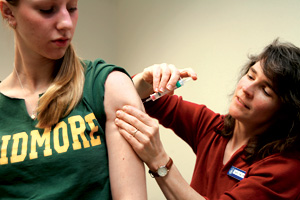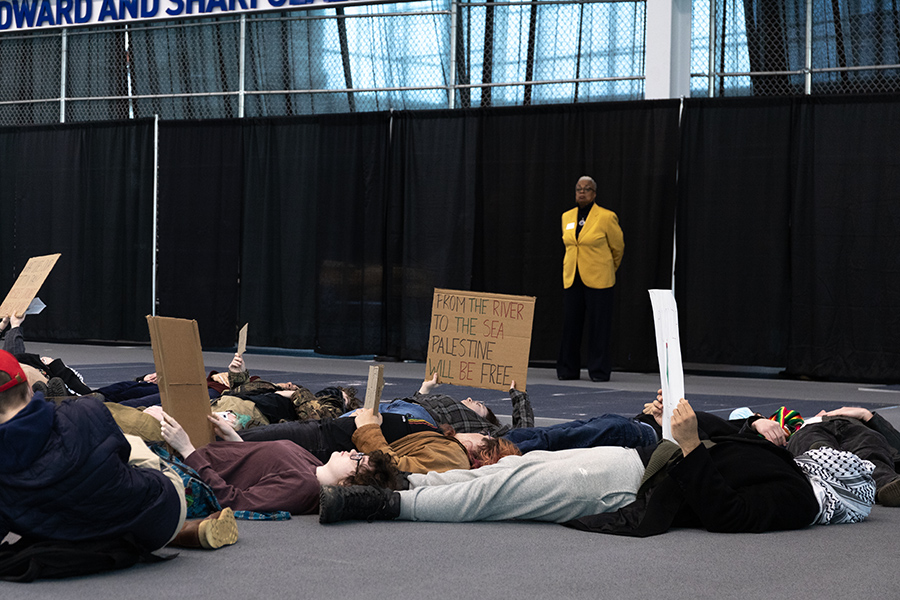Eliot Spitzer said whether the HPV vaccine “will be mandated is something that will be looked at” by the governor, according to the Associated Press.

Many other states across the country have introduced similar bills in an attempt to stop the virus from spreading, some of which require all women ages 9 to 26 to get the vaccine.
Mary Kranz, supervisor of nurses at the Hammond Health Center, said the state’s decision could eventually affect incoming students.
“If some law did pass that mandated our students to get the vaccine, we would have to work with the state to be able to get it to the students financially, as well as it turning into a huge ethical and moral debate,” Kranz said.
Carol Mohler, team leader of the communicable health services unit in the Tompkins County Health Department, said there has never been a vaccine mandated for a virus that was sexually transmitted.
“All vaccines that are required by the college are in place because they are casually communicable,” she said.
The science
Most people with a genital HPV infection do not know they have it. The virus lives in skin or mucous membranes and usually causes no symptoms. HPV can be detected in women through PAP smears by detecting abnormal cell changes. Most women will recover from HPV with no health problems and may develop immunity to some strains, according to Planned Parenthood.
The vaccine prevents the two most common high-risk HPVs, types 16 and 18. Together, the two cause about 70 percent of all cervical cancer. Gardasil also targets HPV types 6 and 11, which cause about 90 percent of genital warts.
Though it cannot cure HPV, Merck said the vaccine offers 100 percent protection against the development of the four HPV types, with few or no side effects.
The research was done by a trio of University of Rochester virologists — William Bonnez, Richard Reichman and Robert Rose — who conceived the idea of a vaccine, which he described as resembing a “soccer ball.” The vaccine is made up of hollow virus-like particles with small samples of HPV inside and a repetitive coat to make our bodies recognize a problem. Other institutions that contributed to developing the vaccine are National Institutes of Health, Georgetown University and University of Queensland in Australia. Rose said developing the vaccine was still something he never imagined he would be able to do.
“It was shocking — thrilling,” Rose said. “It will have a major impact on humans. In a cancer that causes one fourth of a million deaths worldwide, the vaccine will reduce 70 percent of those.”
Rose said the concept could work with STIs, like HIV. An expansion of the HPV vaccine might someday prevent 95 percent of cervical cancer.
The cost
Grace, a senior at New York University whose name has been changed because she asked for anonymity, said she found out she had high-risk HPV two years ago after having sex with only two men.
“I’m now a person with an STD, and now I’m going to have to tell every guy I have any kind of relationship with,” Grace said. “I can’t imagine why there are any girls out there that would not jump at the idea of not ever having to deal with HPV, and possibly cancer,” she said.
Kranz said the college now offers the vaccine at the Health Center for $390 for all three shots, $30 over the national retail price. Because student insurance does not cover preventative measures unless mandated by the state, it does not cover the vaccine.
Kranz said this may be why only about 12 students have been vaccinated. She said she has received many more e-mails from parents about the vaccine. She tells them to check their home health insurance to see if they can defray some of the costs.
“I just really want all students to have the ability to afford the vaccine in some way,” she said.
Most large insurance plans cover recommended vaccines, but there is often lag time between the vaccine recommendation and when it becomes covered by health plans, according to the Center Disease Control. Planned Parenthood does not offer the vaccine because the drug company will not provide it for a clinic price, according to Ithaca’s Planned Parenthood.
Edward Cluett, assistant professor of biology, said developments of vaccines always come down to balancing cost versus the value.
“It is really easy to just take the shots and get rid of the chance,” he said. “Questions you have to ask are: Is the vaccine riskier than the virus? And how long will the protection last?”
Cluett said though cervical cancer occurs only in a low percent of HPV cases, the amount of HPV cases shown in studies is astonishing.
The law
About 25 states are processing different types of bills to mandate the vaccine through schools. On Feb. 2, 2007, Texas became the first state to pass a law when Gov. Rick Perry passed an executive order requiring the Gardasil vaccine for all sixth-grade girls. It is currently being debated in the state Congress.
Senior Dana Jaffe, who has gotten the first shot, said there is no reason to take a risk if a vaccination is available.
“All the shot will do is keep [women] safe from cancer,” she said. “There is nothing wrong with that.”
But not everybody agrees with the new policies. Parents and political groups across the country are fighting the rush to make the vaccine mandatory. Conservative groups say the vaccine will make girls promiscuous and believe they are invincible to STIs. Some say the vaccine would also conflict with Texas’ abstinence-only sexual education laws.
Merck & Co. has lobbied state governments with thousands of dollars during the past two yeas. According to New York Temporary State Commission on Lobbying records, Merck spent $384,203 lobbying New York state legislature from 2003 to 2006. This has brought criticism to vaccine mandate laws. Merck recently suspended its campaign because “it distracted from … the importance of the vaccine and the ability to save lives,” Merck spokesperson Chris Loder said.
Rose, whose two daughters have both received the vaccine, agrees with many state representatives on a compromised law like a bill introduced in Colorado on Jan. 30. This bill would give parents information about the disease and the vaccine, and then give them the opportunity to opt out of the vaccine, or commit to get their daughters vaccinated.
“It has been proven that an opt-out mandate would get many more people to get the vaccine, than a law that makes them have to take the initial action to get vaccinated,” Rose said. “This would push the information right in front of them, where they can make an informed decision.”f around 830 women graduating from Ithaca College this spring, 45 to 60 percent will be infected sometime in their lives with the Human
Papillomavirus (HPV), a sexually transmitted infection (STI). The number of women infected with HPV is 60 percent higher than was previously thought, according to a study released last month by the Centers for Disease Control and Prevention (CDC). The virus is most likely just as prevalent in men.
Almost all cases of cervical cancer are caused by HPV, according to the American Cancer Society (ACS). Though it is a less frequent type of cancer, the ACS predicts about 11,150 women will be diagnosed with invasive cervical cancer in the United States in 2007, and 3,670 will die from the disease by the end of the year.







